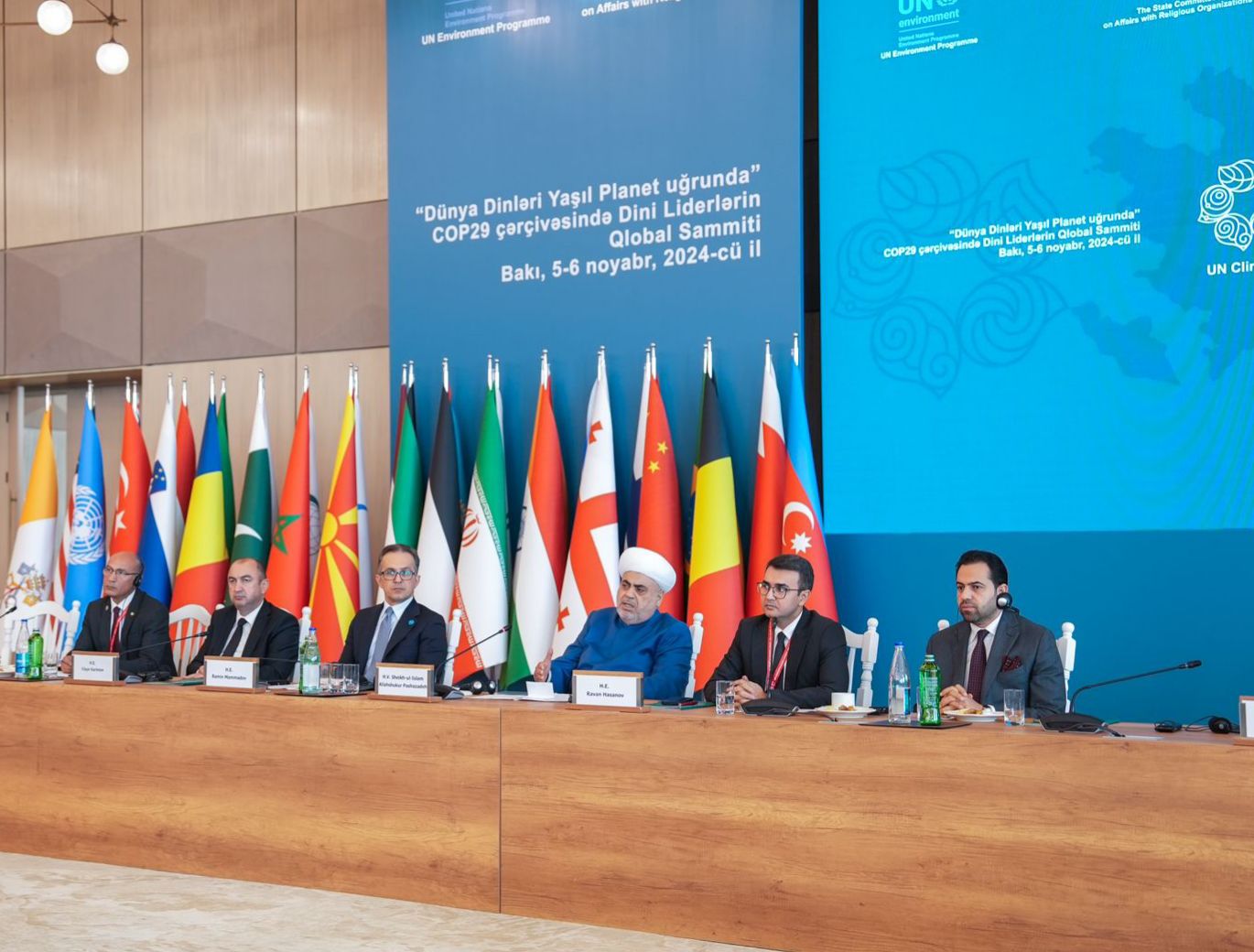In its final statement, the Global Summit of Religious Leaders praises ‘The Call of Conscience: The Abu Dhabi Interfaith Statement for Climate’ and confirms support for the Faith Pavilion at COP29
The Global Summit of Religious Leaders highlighted the critical need to enhance collaboration among political, social, and religious leaders to tackle environmental challenges and climate change and foster global dialogue
The Global Summit of Religious Leaders underscored the urgent necessity to uphold ethical and spiritual values, instilling respect and care for nature and all living beings, while promoting the sanctity and sacredness of the environment
Religious leaders reiterated their support for the decisive action plans set forth at COP28 to address the environmental crises and threats our world faces
Religious leaders emphasized the importance of establishing a permanent advisory council of religious leaders within the Secretariat of the United Nations Framework Convention on Climate Change (UNFCCC)
Concluding in Baku, Azerbaijan, the Global Summit of Religious Leaders was co-organized by the Caucasus Muslims’ Board, the Muslim Council of Elders, the COP29 Presidency, the United Nations Environment Programme, and Azerbaijan's State Committee for Work with Religious Organizations. The summit, held under the patronage of His Excellency President Ilham Aliyev, President of the Republic of Azerbaijan, featured the participation of 300 prominent global religious leaders, foreign government representatives, senior UN officials, heads of international organizations, and religious scholars.
The final statement of the summit praised the ‘Document on Human Fraternity for World Peace and Living Together,’ signed by His Eminence Professor Ahmed Al-Tayeb, Grand Imam of Al-Azhar Al-Sharif, Chairman of the Muslim Council of Elders, and His Holiness Pope Francis, Pontiff of the Catholic Church, in Abu Dhabi, on February 4, 2019. It noted the document’s significant role in advancing dialogue and cooperation across different religions and cultures and fostering values of coexistence, tolerance, and human fraternity. The faith leaders welcomed the ‘Call of Conscience: The Abu Dhabi Interfaith Statement for Climate,’ signed at the COP28 Global Faith Leaders Summit in Abu Dhabi in 2023, which was organized by the Muslim Council of Elders in collaboration with the UAE Ministry of Tolerance and Coexistence and the COP28 Presidency. The final statement from the Global Summit of Religious Leaders, issued today, reiterated its support for the upcoming Faith Pavilion, to be organized by the Muslim Council of Elders at COP29 as a platform for dialogue among faith leaders to find effective solutions to climate issues.
Participants at the summit expressed deep concern about global climate change, biodiversity loss, desertification, drought, land degradation, wildfires, marine pollution, food security, water scarcity, devastating armed conflicts, and terrorism, as well as religious and ethnic violence. These crises lead to innocent casualties, environmental disasters, and the destruction of cultural and religious heritage. They also deplored the severe impacts of environmental genocide and the eradication of cities to combat climate change.
Religious leaders urged COP29 to focus on the pressing need for spiritual reform and ethical enhancement of humanity by fostering respect and care for nature and all creatures, promoting the notion of environmental sanctity, and supporting the robust action plans adopted at COP28 to address the environmental crises and threats the world is facing. They expressed their eagerness to actively participate in implementing these strategies to alleviate the global climate crisis.
Religious leaders also called for increased collaborative efforts among political, social, and religious leaders to address environmental issues and climate change, making ethical and moral considerations central to global climate discussions at COP29. They expressed readiness to establish a permanent advisory council of religious leaders at the UNFCCC Secretariat to spearhead projects and initiatives centred on ethical and religious responsibilities toward the environment and its resources. They stressed the need to promote environmental awareness through religious discourse and bolster the ideological foundations for addressing climate issues, thus supporting global climate action initiatives.
In a related context, religious leaders extended a message of gratitude to His Excellency President Ilham Aliyev for his ongoing support of environmental and humanitarian initiatives, particularly for declaring 2024 the ‘Green World Solidarity Year.’ This initiative reflects Azerbaijan’s commitment to environmental protection and promoting humanitarian solidarity for a sustainable future. They commended Azerbaijan's leadership in overcoming challenges, fostering peace and unity, promoting interfaith and cultural dialogue, and reinforcing the culture of human fraternity and values of peace and tolerance worldwide.
The participants concluded the summit by calling on states, international, regional, religious, and public organizations, as well as faith leaders, to galvanize global support for a more sustainable future. They emphasized the importance of recognizing the sanctity of human life and nature and advocated for an inclusive approach to combating climate change. This approach should particularly focus on engaging representatives from various religions and beliefs, policymakers, scientists, women, youth, indigenous populations, local communities, civil society, business sectors, and other stakeholders in supporting and implementing the long-term goals of the Paris Agreement. This includes preventing the global temperature from exceeding 1.5 degrees Celsius, playing a dynamic role in implementing the global peace agenda, ending armed conflicts and extremist violence that hinder collective climate action efforts, and promoting youth education in equal citizenship and human fraternity. They further urged the protection and respect for religious, cultural, and ethnic diversity while promoting environmental practices based on the spiritual and ethical values of all religions.

